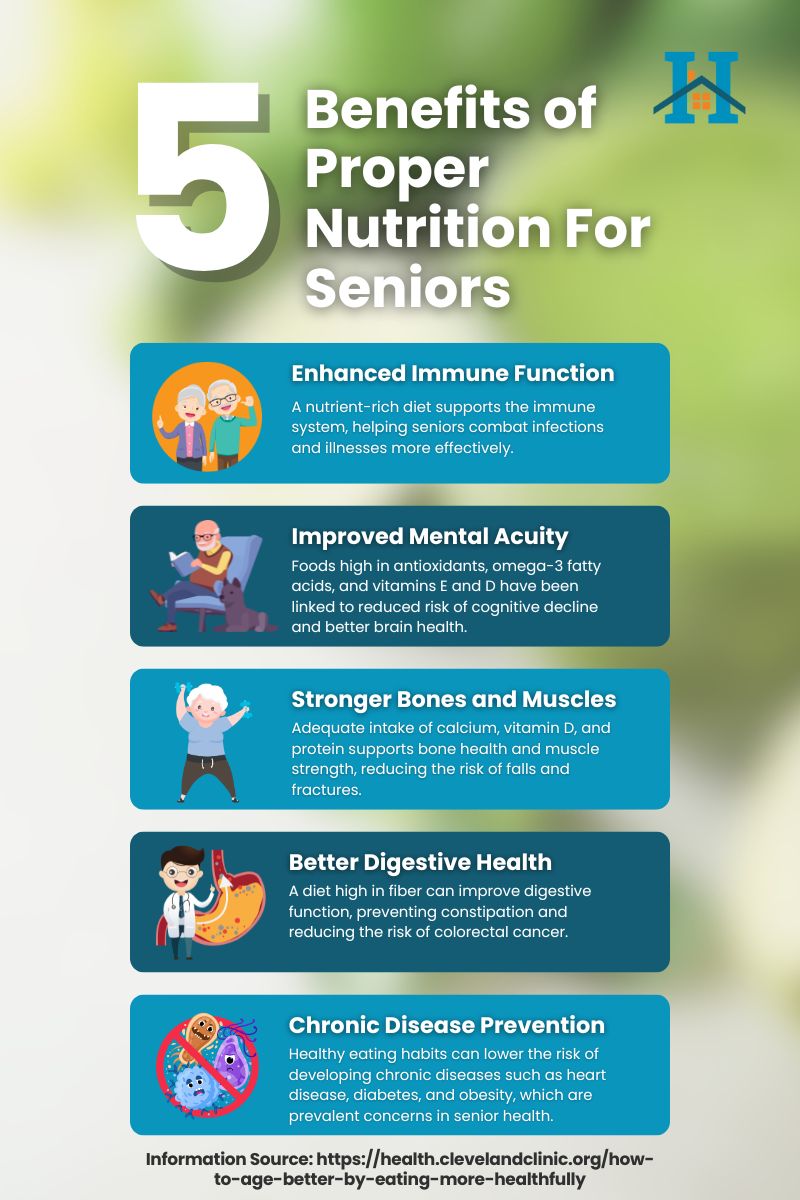In this post we’re taking a closer look at nutrition in senior health and the role it plays.
Aging gracefully isn’t just about adding years to life, but life to those years. As we journey into our senior years, the importance of maintaining a healthy lifestyle becomes more apparent, especially in preventing and battling conditions like colorectal cancer. Proper nutrition plays a pivotal role in this endeavor, offering a multitude of benefits that can enhance the quality of life, promote longevity, and reduce the risk of chronic diseases.
Nutritional Needs for Seniors
As we age, our bodies undergo various changes, affecting metabolism, sensory functions, bone density, and the body’s ability to absorb certain nutrients. These changes necessitate adjustments in our dietary habits to meet our evolving nutritional needs. Seniors should focus on a diet rich in fruits, vegetables, whole grains, lean proteins, and healthy fats to ensure a balanced intake of essential vitamins and minerals. Proper hydration is also very important, because the sense of thirst may diminish with age.
Nutrition in Senior Health:
Benefits of Proper Nutrition for Seniors
- Enhanced Immune Function: A nutrient-rich diet supports the immune system, helping seniors combat infections and illnesses more effectively.
- Improved Mental Acuity: Foods high in antioxidants, omega-3 fatty acids, and vitamins E and D have been linked to reduced risk of cognitive decline and better brain health.
- Stronger Bones and Muscles: Adequate intake of calcium, vitamin D, and protein supports bone health and muscle strength, reducing the risk of falls and fractures.
- Better Digestive Health: A diet high in fiber can improve digestive function, preventing constipation and reducing the risk of colorectal cancer.
- Chronic Disease Prevention: Healthy eating habits can lower the risk of developing chronic diseases such as heart disease, diabetes, and obesity, which are prevalent concerns in senior health.

Let’s Jump into Colorectal Cancer and How it Affects Seniors
Colorectal cancer, also known as bowel cancer, is a type of cancer that starts in the colon or rectum. It typically begins as a growth of tissue called a polyp, which may be benign (non-cancerous) initially but can become cancerous over time. Colorectal cancer usually develops slowly over several years, allowing for early detection and treatment if caught in its early stages.
Risk factors for colorectal cancer include:
- Age: The risk of developing colorectal cancer increases with age, with most cases occurring in individuals over the age of 50. According to the American Cancer Society, about 90% of cases are diagnosed in individuals aged 50 or older.
- Family History: Individuals with a family history of colorectal cancer or certain hereditary conditions, such as familial adenomatous polyposis (FAP) or Lynch syndrome, have an increased risk of developing the disease.
- Personal History of Colorectal Polyps or Cancer: Individuals who have previously had colorectal polyps or cancer are at higher risk of developing the disease again.
- Inflammatory Bowel Diseases (IBD): Chronic inflammatory conditions of the colon, such as ulcerative colitis and Crohn’s disease, can increase the risk of colorectal cancer over time.
- Diet and Lifestyle Factors: A diet high in red and processed meats, low in fiber, and lacking in fruits and vegetables may contribute to an increased risk of colorectal cancer. Additionally, sedentary lifestyle habits, obesity, smoking, and excessive alcohol consumption can also elevate risk.
- Race and Ethnicity: African Americans have a higher incidence of colorectal cancer compared to other racial and ethnic groups in the United States.
Early-stage colorectal cancer often presents with no symptoms, which is why regular screening is crucial, especially for seniors. Screening tests such as colonoscopy, fecal occult blood tests, and stool DNA tests can detect colorectal cancer or precancerous polyps before symptoms develop, increasing the chances of successful treatment.
Combating Colorectal Cancer with Nutrition
Colorectal cancer is a major health concern for seniors, but the risk can be significantly reduced through dietary choices. Here are some strategies to help combat this disease:
- Fiber-Rich Diet: Consuming a diet high in fiber from fruits, vegetables, whole grains, and legumes can help reduce the risk of colorectal cancer. Fiber aids in keeping the digestive system clean and running smoothly.
- Limit Red and Processed Meats: Studies suggest that reducing the intake of red and processed meats can lower the risk of colorectal cancer.
- Incorporate Cancer-Fighting Foods: Foods containing folate, selenium, and antioxidants are known to have cancer-fighting properties. Incorporate leafy greens, nuts, and berries into your diet.
- Moderation in Alcohol Consumption: Limiting alcohol intake can also reduce the risk of colorectal cancer. For seniors, moderation is key.
- Maintain a Healthy Weight: Obesity increases the risk of colorectal cancer. A balanced diet combined with regular physical activity can help maintain a healthy weight.
Practical Tips for Seniors
- Plan Balanced Meals: Use tools like the USDA’s MyPlate as a guide to ensure a well-balanced diet.
- Stay Hydrated: Drink water regularly and consume foods with high water content.
- Mind Portion Sizes: As metabolic rates slow down, seniors need fewer calories. Paying attention to portion sizes can help prevent weight gain and associated health issues.
- Seek Professional Advice: Consulting a dietitian can provide personalized dietary advice considering medical conditions and nutritional needs.
Proper nutrition in senior health is a cornerstone of healthy aging and a powerful ally in the fight against colorectal cancer. By making informed dietary choices, seniors can enhance their quality of life, boost their health, and enjoy their golden years to the fullest. Remember, it’s never too late to adopt healthier eating habits and reap the benefits they bring.
Resource References:
- American Cancer Society: www.cancer.org
- National Cancer Institute (NCI): www.cancer.gov
- Centers for Disease Control and Prevention (CDC): www.cdc.gov
- Mayo Clinic: www.mayoclinic.org
- World Health Organization (WHO): www.who.int

